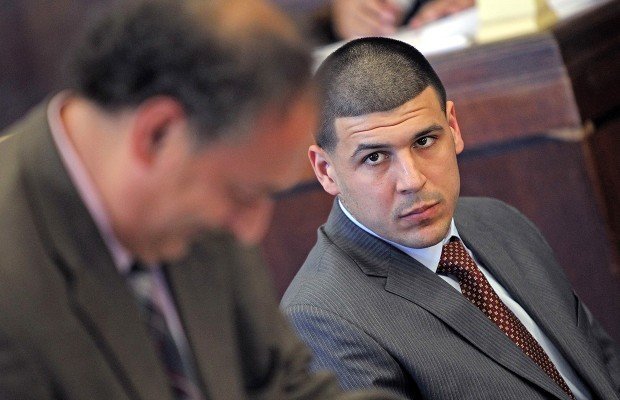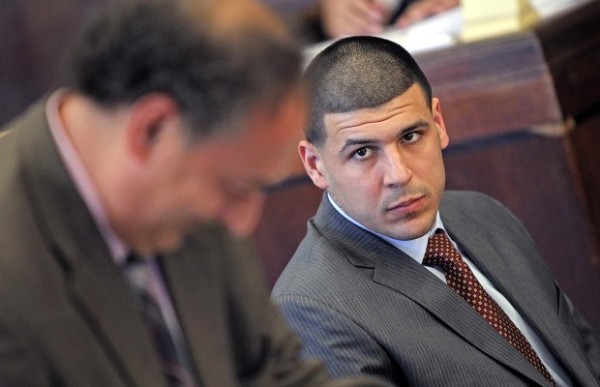

Neither side nor the judge would say what that evidence is. But Locke did say it relates to a defendant’s right to seek confidential legal advice from a lawyer.
A law enforcement official close to the investigation told media outlets that the issue centers on whether prosecutors should be allowed to have access to Hernandez’s cellphone. The official was not authorized to release details and spoke on condition of anonymity.
Tuesday’s hearing began with about 40 minutes of sidebar conversation between the judge, prosecutors, and defense attorneys. Hernandez joined the whispering group, legs shackled and hands tucked in the pockets of his suit.
Locke then ordered the courtroom cleared, offering an explanation for his unusual actions from the bench.
“Our courts operate publicly,” said Locke. “All are invited to attend, except when there is some interest that is so overriding and is likely to be prejudiced that a courtroom ought to be closed solely for the purpose of discussing that protected interest.”
Locke said he expected attorneys to fight over two motions that are sealed and have not been made public. The first, he said, concerns evidence that is held by a law firm that once represented Hernandez, that the Commonwealth argues is necessary to its case but that it is not able to obtain without court order. The second, Locke said, concerns a request by the Commonwealth for the issuance of a search warrant.
Both motions, Locke said, could affect Hernandez’s Fifth Amendment right against self-incrimination, his Sixth Amendment right to a fair trial, and his right to “seek confidential and protected legal advice and services” — meaning his attorney-client privilege.
Locke, defense attorneys, and Conley’s office did not identify what the physical evidence is that both sides are fighting over. And once the closed-door session finished, no one offered any public explanation.
Hernandez is already serving life without parole following his first-degree murder conviction in Bristol Superior Court for the 2013 killing of Odin L. Lloyd, who was dating the sister of Hernandez’s fiancee, in North Attleborough.
Hernandez, who was in court Tuesday, gave the cellphone to one of his lawyers in June 2013.
Locke did not immediately rule on the request from prosecutors but said he expects to issue his decision within two weeks.
Charles Rankin, one of Hernandez’s attorneys, told the judge that no matter which way he rules, the losing side is likely to appeal the ruling to the Supreme Judicial Court, which will inevitably delay the start of the trial.
Locke set the new date for January, saying the trial could be further delayed if the appeal is still pending before the high court.
Prosecutors say Hernandez fatally shot Safiro Furtado and Daniel de Abreu in July 2012 after a chance encounter at a Boston nightclub. Hernandez has pleaded not guilty.

